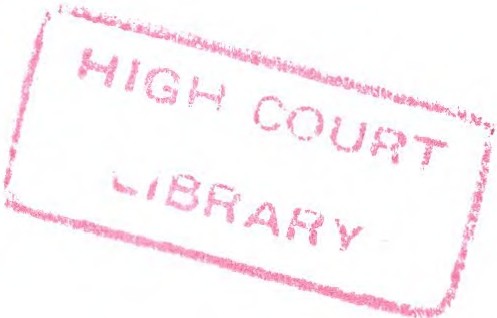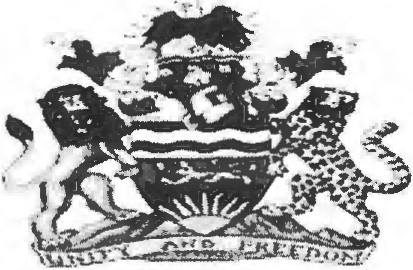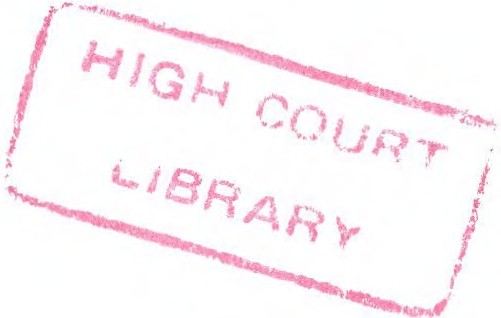Kenyatta Nyirenda, J. The State v. Malawi Revenue authority Exp. Victor Ntuwa

 J
J
JUDICIARY  IN THE HIGH COURT OF MALAWI
IN THE HIGH COURT OF MALAWI
PRINCIPAL REGISTRY
JUDICIAL REVIEW CAUSE NO 1 OF 2017
BETWEEN:
THE STATE
-AND-
MALAWI REVENUE AUTHORITY ………………………..RESPONDENT
EX PARTE VICTOR NTUWA .......................................... APPLICANT
CORAM: THE HONOURABLE JUSTICE KENYATTA NYIRENDA
Mr. Kandako Mhone, of Counsel, for the Applicant
Mrs. Kambuwa, of Counsel, for the Respondent
Mr. O. Chitatu, Court Clerk

RULING

Kenyatta Nyirenda, J.
. .
The Applicant has made an ex parte application under O. 53, r. 3 of the Rules of the Supreme Court (RSC) to obtain leave of this Court for him to make an application for judicial review against the Respondent's decision to impound motor vehicle registration number MH 6080 [Hereinafter referred to as the "application"].
Ordinarily, applications of this sort are dealt with in summary fashion, that is, the judge may determine the application for leave without a hearing and the judge need not sit in open court for that purpose: see O . 53, r. 3(3) of RSC and the case of the State and others; Ex parte Ziliro Qabaniso Chibambo [2007] MLR 372. However, having looked at the nature of the application, I perceived that the best way to deal with it was by way of inter-partes hearing. I, accordingly, ordered an inter parte hearing. On the set hearing day, Counsel Mhone addressed me in
support of the application and Counsel Kambuwa responded by arguing in opposition to the granting of the application.
The decision which the Applicant seeks to be judicially reviewed [hereinafter referred to as the "challenged decision"], the reliefs being sought and the grounds on which reliefs are sought are contained in the Notice of Application for Leave to Apply for Judicial Review, otherwise known as "Form 86A". The Applicants seeks release of the motor vehicle on the ground that it was impounded without reasonable cause.
Form 86A is supported by an Affidavit Verifying Facts on which Leave for Judicial Review is being sought, which reads as follows:
"2. That I am a business man and that I do visit neighboring countries including South Africa, Botswana, Namibia, Zambia, Zimbabwe, Mozambique, e .t. c.
3. That in the year 2014 I brought into the country a motor vehicle: Volkswagen - Amarok. The said motor vehicle was presented to the Malawi Revenue Authority offices where all the necessary duties were paid.
4. That the MRA issued to me the required documents, customs clearance certificate which I then presented to the Road Traffic Department for the registration of the vehicle in Malawi: The vehicle was duly registered and a certificate of registration was duly issued: see exhibits marked "VN 1".
5. That on or about 13th December, 2016 MRA officers led by Mr. Nyirenda came to Liwonde and requested that I show them the necessary papers for the vehicle, which I did. Mr. Nyirenda conceded that he saw nothing wrong with the papers. However, he insisted that he had to take to their vehicle Blantyre office.
6. That I protested his decision and as a compromise it was agreed that the vehicle be kept at Liwonde Police. The MRA officers then issued to me exhibit marked "VN 2".
7. That I was later asked by Mayi Nkhata of MRA to send to her the Registration Certificate of the vehicle. I did. She then phoned advising that the vehicle was indeed registered at the Road Traffic Department.
8. That I wrote a letter to Mayi Nkhata asking her to release my vehicle but she refused: see the exhibit marked “VN 3”.
9. That on 22nd December, 2016 MRA officials came to Liwonde Police Station and took away my vehicle. They issued to me a notice of Seizure: see exhibit marked "VN 4".
10. That my vehicle is being seized without any probable or reasonable cause. "
The Respondent opposes the application in its entirety and it has, to this end, filed an affidavit in opposition, sworn by Linda Kambuwa wherein she deposes as follows:
"3. THAT the Respondent got information that the Applicant had a white Amarok' double cabin with registration number MH6080, and that customs duty on same was never paid
4. THAT acting on the said information the Respondent intercepted the said vehicle, a Volkswagen Amarok, with Chassis number WVZZZ2HZB8049956, with registration number MH 6080, and same was seized under seizure notice number 004908. A copy of the said notice hereto and exhibited a marked "LK".
5. THAT when the registration of the seized vehicle was run through the motor Vehicle Enquiry System at the Department of Road traffic, the same registration number "belonged " to a single cab, white Volkswagen Caddy. However, and surprisingly so with the same chassis number as the double cab Amarok which had been seized by the Respondent.
6. THAT further search indicated that, this white Volkswagen Caddy had a cu toms clearance number which did not exist in the Respondent's system which in itself is a clear indication that customs duty on the same was ever paid even though t was registered A copy of the said motor vehicle enquiry report is attached hereto and exhibited as marked " LK2"
7. THAT when the chassis number as seen on the Amarok was run through the Vehicle identification system, it was noted that the chassis number belonged to a twin cab Amarok, the same one that was seized by the Respondent,. A copy of the said motor vehicle enquiry report is attached and exhibited as marked "LK3"
8. THAT the motor vehicle that is being prayed for by the Applicant in his affidavit as per his Exhibit VNJ, is not the same vehicle in the possession of the Respondent, as such the Respondent cannot release what it never seized Alternatively, it the Applicant seeks restoration of a motor vehicle which was seized by the Respondent under seizure note number 004908, then customs duty on the same was never paid despite having been registered at the Department of Road Traffic.
9. THAT clearly the Applicant has not come to this Court with clean hands, it not possible for two different cars to have the same chassis number and registration number.
10. THAT clearly it is clear from the foregoing that the motor vehicle was smuggled into the country and was fraudulently registered with the Road Traffic Department. The applicant can no therefore be allowed to benefit from his wrong
11. THAT since the Respondent has successfully intercepted the twin cab, Volkswagen Amarok, in the possession of the Applicant, and customs duty of same was ever paid to the Respondent, the Respondent not shall keep the said vehicle pending the payment of customs duty and penalties.
12. THAT unless and until customs and the penalties on the dais motor vehicle are fully paid, the reliefs being sought by the Applicant herein are not obtainable"
The submissions by Counsel Mhone were brief and concise:
"Judicial review concerned with the decision making process and not the merits of the matters: Khembo v. Khembo (National Compensation Tribunal) MCR 2004 P.151. In this regard if the process is faulty, leave has to be granted
There is no dispute that the applicant brought a vehicle into the country. There is also no dispute that the vehicle was presented at the Respondent's office for it to issue the Customs Clearance Certificate (CCC).
There is no dispute that the CCC was presented to the applicant to the Road Traffic Directorate in order for them to register the vehicle; which they did There is no dispute that the vehicle is duly registered in Malawi as MH 6080.
MRA- officials had intended to inspect the papers for the vehicle which the applicant gave to them. They found nothing wrong with them. However, they decided to detain the vehicle ...
We submit that the conditions have been met and that leave for judicial review should be granted"
It is the Respondent's case that there is no arguable case for judicial review. For reasons which appear presently, it is necessary to reproduce the Respondent's "Arguendo" in extensio:
"3.1 The vehicle in question was seized by the Respondent based on the information that despite the said motor vehicle having been [registered] by the Road Traffic Department, customs duty on same was never paid As such the vehicle is and will remain under customs control until customs duty is paid
3.2 From the documents attached in the Applicant's affidavit, it is clear that Applicant is the owner of "a vehicle" however possibly not even the vehicle
seized by the Respondent. This is because there two vehicles with the same chassis number and registration number.
3.3 . The Respondent hereby argues that in terms of section 119 and 156 of the Customs and Excise Act, the general important is that onus to prove the payment of proper duties is always on the owner of goods. In this case, the Applicant must furnish proof that duty was paid other than just to allege it in an affidavit. Without that proof remains liable to seizure and will in remain in detention under customs control.
3.4 Furthermore, just the motor vehicle found its way to be registered at the Department of Road Traffic, is no guarantee that indeed customs duty on the same was paid. The Respondent and the Road Traffic Department are two separate entities each with its own systems. This is why the Respondent in its affidavit has denied that the duty was ever paid by the Applicant simply because the motor vehicle was registered with the Road Traffic Department.
3.5 Finally, in as much as the Applicant fits the description of the "owner", it is not quite clear as to which car he really owns because two cars cannot bear the same chassis numbers. so the onus is on the Applicant to prove which car he really owns of the two (both of which customs duty was never paid for),"
Counsel Kambuwa concluded by submitting that the Respondent acted lawfully in seizing the motor vehicle, and the continued detention of the motor vehicle remains lawful.
My task at this stage is to determine whether I am satisfied that the Applicant has disclosed a case fit for further investigations at a full hearing of the substantive application for judicial review, for which the Applicant seeks leave: see State and others; Ex parte Ziliro Qabaniso Chibambo, supra.
It is also important at this juncture to backtrack and remember the matters that must obtain for an applicant to be granted leave. It is trite that a court faced with an application for leave ought to be satisfied that (a) the person intended to be made a respondent is amenable to judicial review, (b) the applicant has sufficient interest in the matter to which the application relates, (c) the matters/issues raised in Form 86A show a prima facie case fit for further investigations at the intended judicial review proceedings, (d) the applicant does not have an alternative remedy oravenue that would resolve his or her complaint, (e) the application is made promptly, and in any event within three months of the date on which the grounds for the application first arose: see Malawi Communications Regulatory Authority v. Makande and Another, MSCA Civil Appeal No. 28 of 2013 (unreported)
At the leave stage, there is no need for the court to go into the matter in depth. The essential burden of an applicant at this stage is as was enunciated by the Supreme Court of Appeal in the case of Ombudsman v. Malawi Broadcasting Corportion [1999] MLR 329 at 333:
"The law applicable to an application for leave to apply for judicial review is very clear. Once the court is satisfied, after going through the material before it, that there is an arguable case, then leave should be granted. The discretion that the court exercises at this stage is not the same as that, which the court is called on to exercise when all the evidence in the matter has been fully argued at the hearing of the application, se (IRC v Federation of Self Employed [1991J 2 ALL ER 93"
Having examined the Originating Motion for Judicial Review, affidavit evidence and the submissions by both Counsel, I have great difficulties to accept the contention by the Respondent that there is no arguable case. The different arguments raised by the Applicant and the Respondent are self revealing. For instance, there is the question whether the motor vehicle that the Plaintiff claims to be the owner thereof is the same motor vehicle that the Respondent seized. There is also the question whether or not customs duty on the motor vehicle was paid despite the fact that it was registered at the Department of Road Traffic.
In the circumstances, I am very much persuaded that the conduct of the Respondent vis -a - vis the Applicant's application for leave calls for a further investigation by way of, judicial review. I would, therefore, grant leave to the Applicant to commence substantive judicial review proceedings.
Before resting, it will be observed that it is clear from a perusal of the Form 86A and the affidavits that the case herein relates to a revenue matter, as defined in section 2 of the Courts (Amendment) Act, 2016 [Act No. 23 of 2016]. In terms of section 6A of the Courts Act, it is the Revenue Division that is charged with hearing revenue matters.
The Revenue Division was not operational at the time of commencement of this case. Having regard to the fact that the substantive case of judicial review has yet to take place, I reckon that it is imperative that the matter be transferred to the Revenue Division. It is so ordered.
Pronounced in Court this 5th day of June 2017 at Blantyre in the Republic of Malawi.
_______________
Kenyatta Nyirenda
JUDGE
1